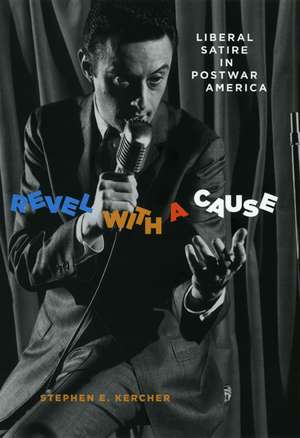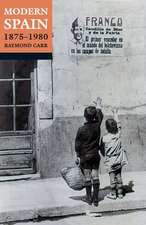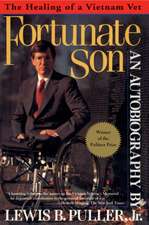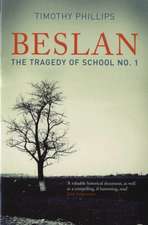Revel with a Cause: Liberal Satire in Postwar America: Emersion: Emergent Village resources for communities of faith
Autor Stephen E. Kercheren Limba Engleză Hardback – 9 oct 2006
We live in a time much like the postwar era. A time of arch political conservatism and vast social conformity. A time in which our nation’s leaders question and challenge the patriotism of those who oppose their policies. But before there was Jon Stewart, Al Franken, or Bill Maher, there were Mort Sahl, Stan Freberg, and Lenny Bruce—liberal satirists who, through their wry and scabrous comedic routines, waged war against the political ironies, contradictions, and hypocrisies of their times.
Revel with a Cause is their story. Stephen Kercher here provides the first comprehensive look at the satiric humor that flourished in the United States during the 1950s and early 1960s. Focusing on an impressive range of comedy—not just standup comedians of the day but also satirical publications like MAD magazine, improvisational theater groups such asSecond City, the motion picture Dr. Strangelove, and TV shows like That Was the Week That Was—Kercher reminds us that the postwar era saw varieties of comic expression that were more challenging and nonconformist than we commonly remember. His history of these comedic luminaries shows that for a sizeable audience of educated, middle-class Americans who shared such liberal views, the period’s satire was a crucial mode of cultural dissent. For such individuals, satire was a vehicle through which concerns over the suppression of civil liberties, Cold War foreign policies, blind social conformity, and our heated racial crisis could be productively addressed.
A vibrant and probing look at some of the most influential comedy of mid-twentieth-century America, Revel with a Cause belongs on the short list of essential books for anyone interested in the relationship between American politics and popular culture.
Revel with a Cause is their story. Stephen Kercher here provides the first comprehensive look at the satiric humor that flourished in the United States during the 1950s and early 1960s. Focusing on an impressive range of comedy—not just standup comedians of the day but also satirical publications like MAD magazine, improvisational theater groups such asSecond City, the motion picture Dr. Strangelove, and TV shows like That Was the Week That Was—Kercher reminds us that the postwar era saw varieties of comic expression that were more challenging and nonconformist than we commonly remember. His history of these comedic luminaries shows that for a sizeable audience of educated, middle-class Americans who shared such liberal views, the period’s satire was a crucial mode of cultural dissent. For such individuals, satire was a vehicle through which concerns over the suppression of civil liberties, Cold War foreign policies, blind social conformity, and our heated racial crisis could be productively addressed.
A vibrant and probing look at some of the most influential comedy of mid-twentieth-century America, Revel with a Cause belongs on the short list of essential books for anyone interested in the relationship between American politics and popular culture.
Din seria Emersion: Emergent Village resources for communities of faith
-
 Preț: 144.99 lei
Preț: 144.99 lei -
 Preț: 133.99 lei
Preț: 133.99 lei - 9%
 Preț: 352.50 lei
Preț: 352.50 lei -
 Preț: 146.50 lei
Preț: 146.50 lei -
 Preț: 208.32 lei
Preț: 208.32 lei -
 Preț: 156.84 lei
Preț: 156.84 lei -
 Preț: 115.53 lei
Preț: 115.53 lei -
 Preț: 548.71 lei
Preț: 548.71 lei - 8%
 Preț: 346.31 lei
Preț: 346.31 lei - 8%
 Preț: 360.28 lei
Preț: 360.28 lei -
 Preț: 216.90 lei
Preț: 216.90 lei -
 Preț: 101.43 lei
Preț: 101.43 lei -
 Preț: 215.52 lei
Preț: 215.52 lei -
 Preț: 185.37 lei
Preț: 185.37 lei - 8%
 Preț: 563.24 lei
Preț: 563.24 lei -
 Preț: 179.04 lei
Preț: 179.04 lei -
 Preț: 106.35 lei
Preț: 106.35 lei -
 Preț: 138.81 lei
Preț: 138.81 lei -
 Preț: 273.93 lei
Preț: 273.93 lei -
 Preț: 127.89 lei
Preț: 127.89 lei - 9%
 Preț: 353.24 lei
Preț: 353.24 lei -
 Preț: 176.49 lei
Preț: 176.49 lei -
 Preț: 94.22 lei
Preț: 94.22 lei -
 Preț: 144.80 lei
Preț: 144.80 lei -
 Preț: 126.25 lei
Preț: 126.25 lei -
 Preț: 67.35 lei
Preț: 67.35 lei -
 Preț: 163.52 lei
Preț: 163.52 lei -
 Preț: 138.26 lei
Preț: 138.26 lei -
 Preț: 182.98 lei
Preț: 182.98 lei - 18%
 Preț: 502.35 lei
Preț: 502.35 lei - 18%
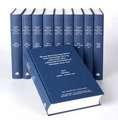 Preț: 2261.34 lei
Preț: 2261.34 lei -
 Preț: 279.55 lei
Preț: 279.55 lei -
 Preț: 116.07 lei
Preț: 116.07 lei -
 Preț: 208.55 lei
Preț: 208.55 lei -
 Preț: 167.85 lei
Preț: 167.85 lei -
 Preț: 160.63 lei
Preț: 160.63 lei -
 Preț: 183.89 lei
Preț: 183.89 lei - 9%
 Preț: 352.77 lei
Preț: 352.77 lei -
 Preț: 307.55 lei
Preț: 307.55 lei - 12%
 Preț: 290.56 lei
Preț: 290.56 lei - 8%
 Preț: 311.68 lei
Preț: 311.68 lei -
 Preț: 120.81 lei
Preț: 120.81 lei -
 Preț: 229.92 lei
Preț: 229.92 lei - 6%
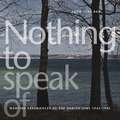 Preț: 324.95 lei
Preț: 324.95 lei -
 Preț: 145.41 lei
Preț: 145.41 lei -
 Preț: 152.07 lei
Preț: 152.07 lei -
 Preț: 186.09 lei
Preț: 186.09 lei - 18%
 Preț: 348.59 lei
Preț: 348.59 lei -
 Preț: 302.76 lei
Preț: 302.76 lei - 8%
 Preț: 565.01 lei
Preț: 565.01 lei
Preț: 398.51 lei
Nou
Puncte Express: 598
Preț estimativ în valută:
76.27€ • 79.33$ • 62.96£
76.27€ • 79.33$ • 62.96£
Carte tipărită la comandă
Livrare economică 14-28 aprilie
Preluare comenzi: 021 569.72.76
Specificații
ISBN-13: 9780226431642
ISBN-10: 0226431649
Pagini: 572
Ilustrații: 48 halftones
Dimensiuni: 152 x 229 x 41 mm
Greutate: 0.92 kg
Editura: University of Chicago Press
Colecția University of Chicago Press
Seria Emersion: Emergent Village resources for communities of faith
ISBN-10: 0226431649
Pagini: 572
Ilustrații: 48 halftones
Dimensiuni: 152 x 229 x 41 mm
Greutate: 0.92 kg
Editura: University of Chicago Press
Colecția University of Chicago Press
Seria Emersion: Emergent Village resources for communities of faith
Notă biografică
Stephen Kercher is assistant professor of history at the University of Wisconsin–Oshkosh.
Cuprins
Acknowledgments
Introduction: Liberal Satire in Postwar America
Part One: The Positive Uses of Humor
1 Bill Mauldin and the Politics of Postwar American Satire
2 “We Shall Meet the Enemy”: Herbert Block, Robert Osborn, Walt Kelly, and Liberal Cartoonists’ “Weapon of Wit”
Part Two: The Cleansing Lash of Laughter
3 Comic Revenge: Parodic Revelry and “Sick” Humor in the 1950s Satiric Underground
4 “Truth Grinning in a Solemn, Canting World”: Liberal Satire’s Masculine, “Sociologically Oriented and Psychically Adjusted” Critique
5 Spontaneous Irony: The Second City, the Premise, and Early Sixties Satiric Cabaret and Revue
Part Three: The Politics of Laughter
6 “We Hope You Like Us, Jack”: Liberal Political Satire, 1958–63
7 “Are There Any Groups Here I Haven’t Offended Yet?”: Liberal Satire Takes a Stand
8 “Well-Aimed Ridicule”: Satirizing American Race Relations
9 Mocking Dr. Strangelove; or, How American Satirists Flayed the Cold War, the Bomb, and American Foreign Policy in Southeast Asia
Part Four: The Limits of Irreverence
10 “Sophisticated Daring” and Political Cowardice: Television Satire and NBC’s That Was the Week That Was
11 Satire That Would “Gag a Goat”: Crossing the Line with Paul Krassner and Lenny Bruce
Introduction: Liberal Satire in Postwar America
Part One: The Positive Uses of Humor
1 Bill Mauldin and the Politics of Postwar American Satire
2 “We Shall Meet the Enemy”: Herbert Block, Robert Osborn, Walt Kelly, and Liberal Cartoonists’ “Weapon of Wit”
Part Two: The Cleansing Lash of Laughter
3 Comic Revenge: Parodic Revelry and “Sick” Humor in the 1950s Satiric Underground
4 “Truth Grinning in a Solemn, Canting World”: Liberal Satire’s Masculine, “Sociologically Oriented and Psychically Adjusted” Critique
5 Spontaneous Irony: The Second City, the Premise, and Early Sixties Satiric Cabaret and Revue
Part Three: The Politics of Laughter
6 “We Hope You Like Us, Jack”: Liberal Political Satire, 1958–63
7 “Are There Any Groups Here I Haven’t Offended Yet?”: Liberal Satire Takes a Stand
8 “Well-Aimed Ridicule”: Satirizing American Race Relations
9 Mocking Dr. Strangelove; or, How American Satirists Flayed the Cold War, the Bomb, and American Foreign Policy in Southeast Asia
Part Four: The Limits of Irreverence
10 “Sophisticated Daring” and Political Cowardice: Television Satire and NBC’s That Was the Week That Was
11 Satire That Would “Gag a Goat”: Crossing the Line with Paul Krassner and Lenny Bruce
Conclusion Liberal Satire’s Last Laughs
Notes
Selected Discography and Bibliography
Index
Notes
Selected Discography and Bibliography
Index
Recenzii
"The book is almost encyclopedic in its breadth, serving as a useful overview of the many ways in which postwar satire articulated cultural criticism. . . . Indispensable for understanding the role of humor in contemporary American culture."
"Kercher's book offers an indispensable account of what it meant to be funny about unfunny things in postwar America."
"The prose never becomes overwhelmed by detail and the judgements are consistently informed, balanced and judicious. An added pleasure is the reproduction of some memorable cartoons among the various illustrations. Altogether it is an impressive achievement."
"Kercher's work is exceptionally well researched, very readable, and covers an impressive range of examples. . . . A book that is informative, engaging, thoughtful, and, for individuals who lived through those times, nostalgic."
